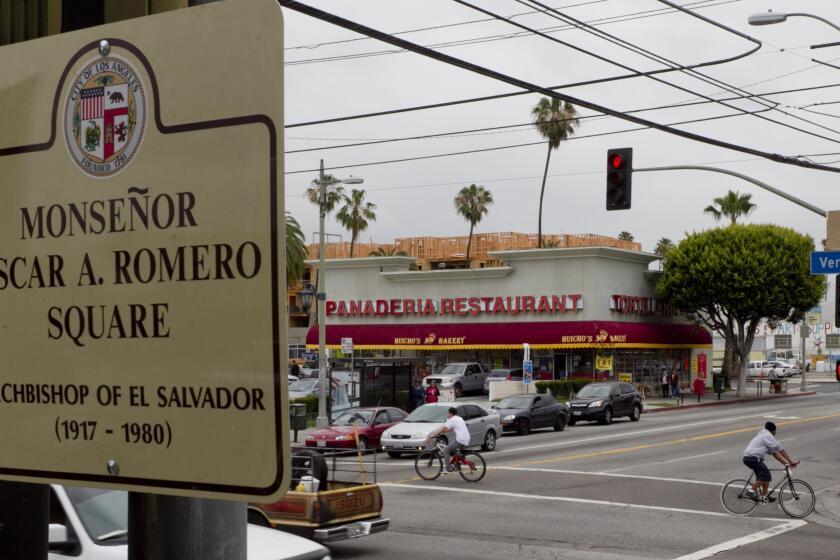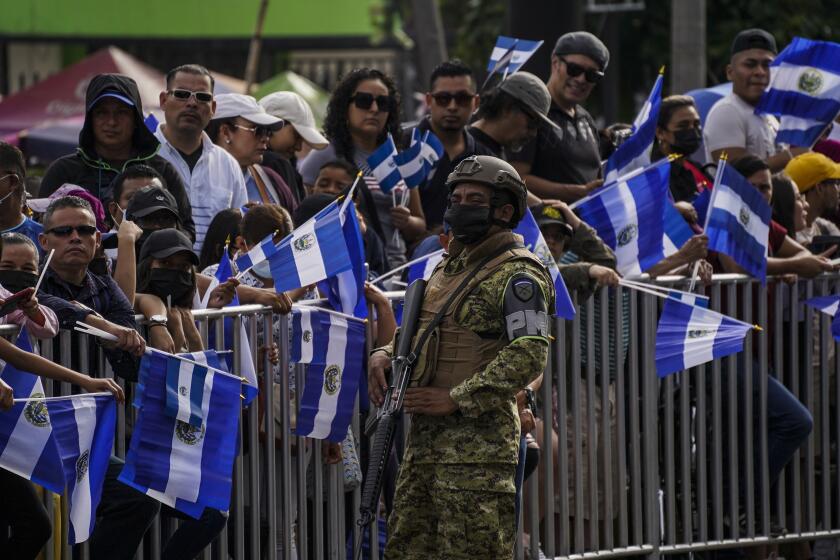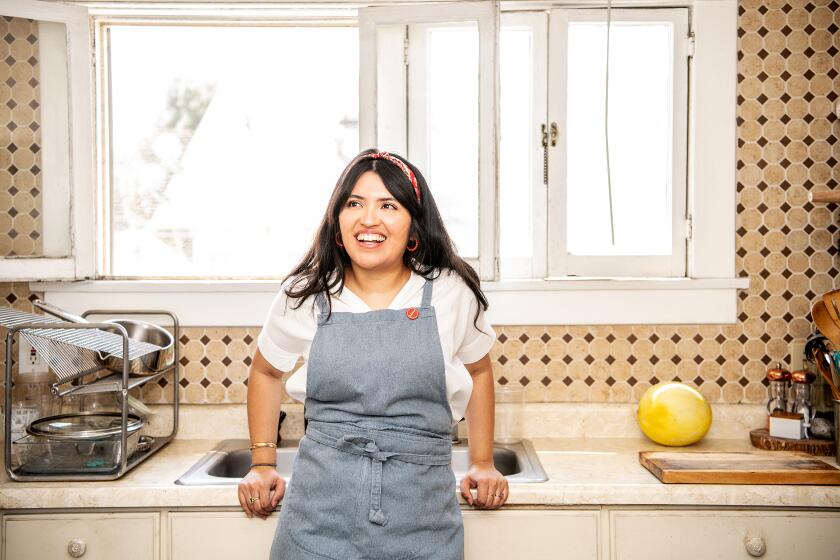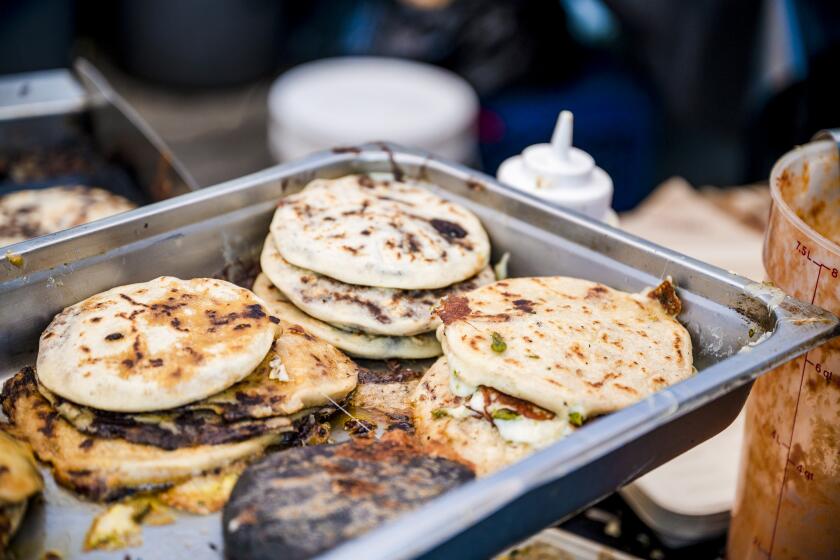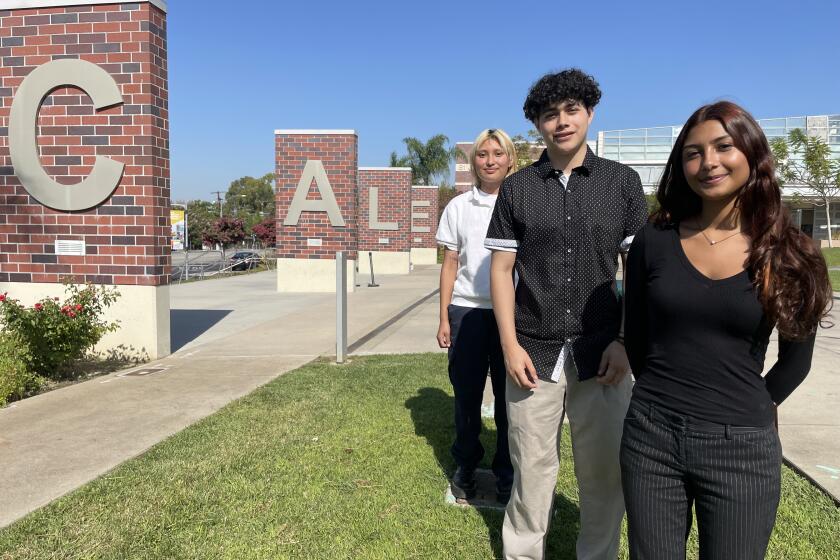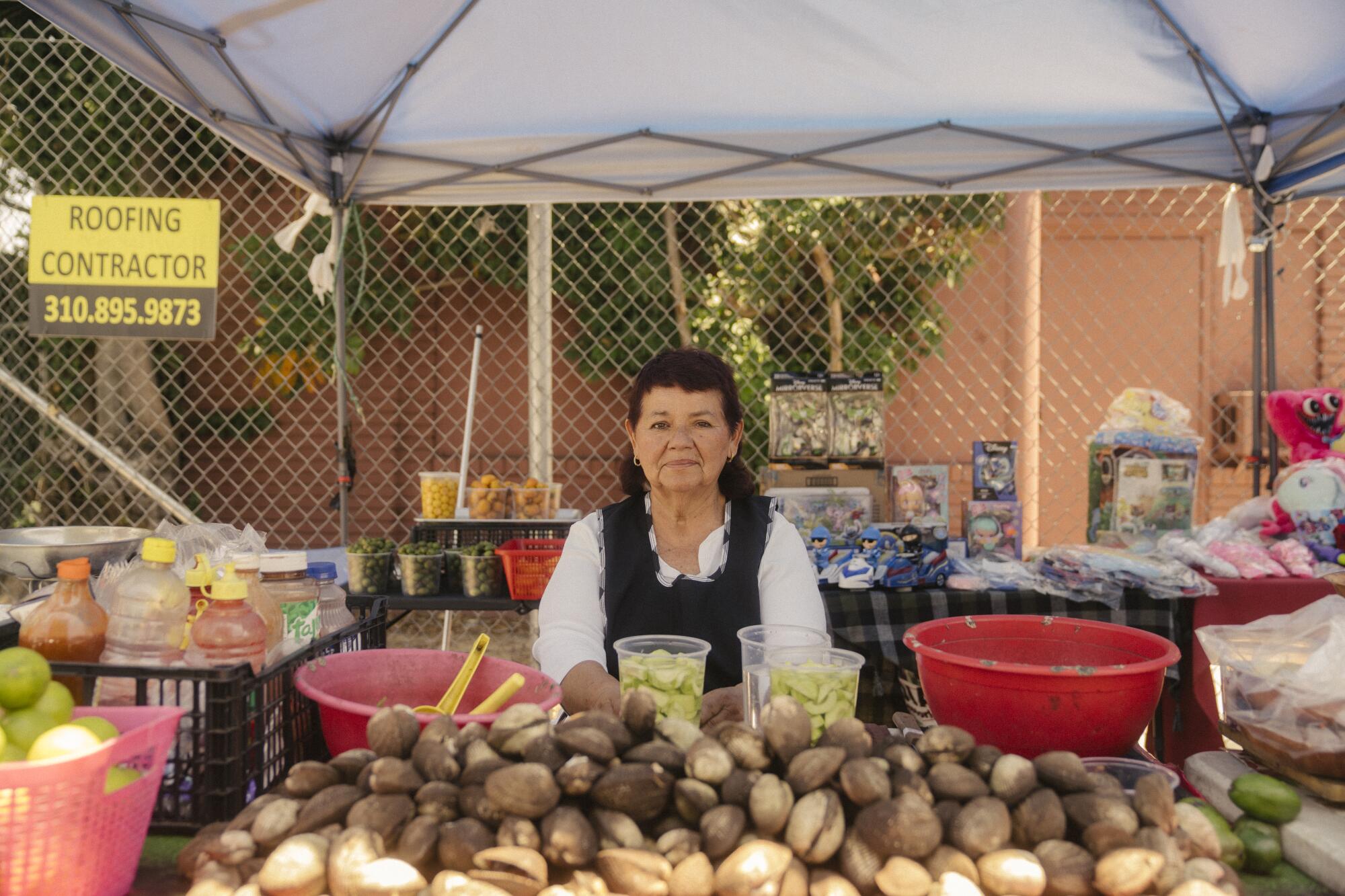
The longtime market on Vermont Avenue has returned after a difficult year, but can its vendors find a way to survive?
- Share via
Mother and daughter Berta and Rebecca Mendez have built a life like tens of thousands of others who survive in Los Angeles: selling stuff on the street. They’ve done so for the past 15 years in a dense section of central Los Angeles known as the El Salvador Community Corridor.
At the informal street market that sprung up here on Vermont Avenue, between 11th and 13th streets, the women offer Salvadoran staples like atado de panela (raw brown sugar), carne salada, queso duro viejo, loroco flower buds and, most of all, sweets: specialty Salvadoran candies made of coconut, sapote or squash.
The Mendez women have developed a loyal customer base and reliable working days and hours, and they maintain tight margins for supplies and sales. Yet as street vendors, they run their business in a state of perpetual uncertainty.
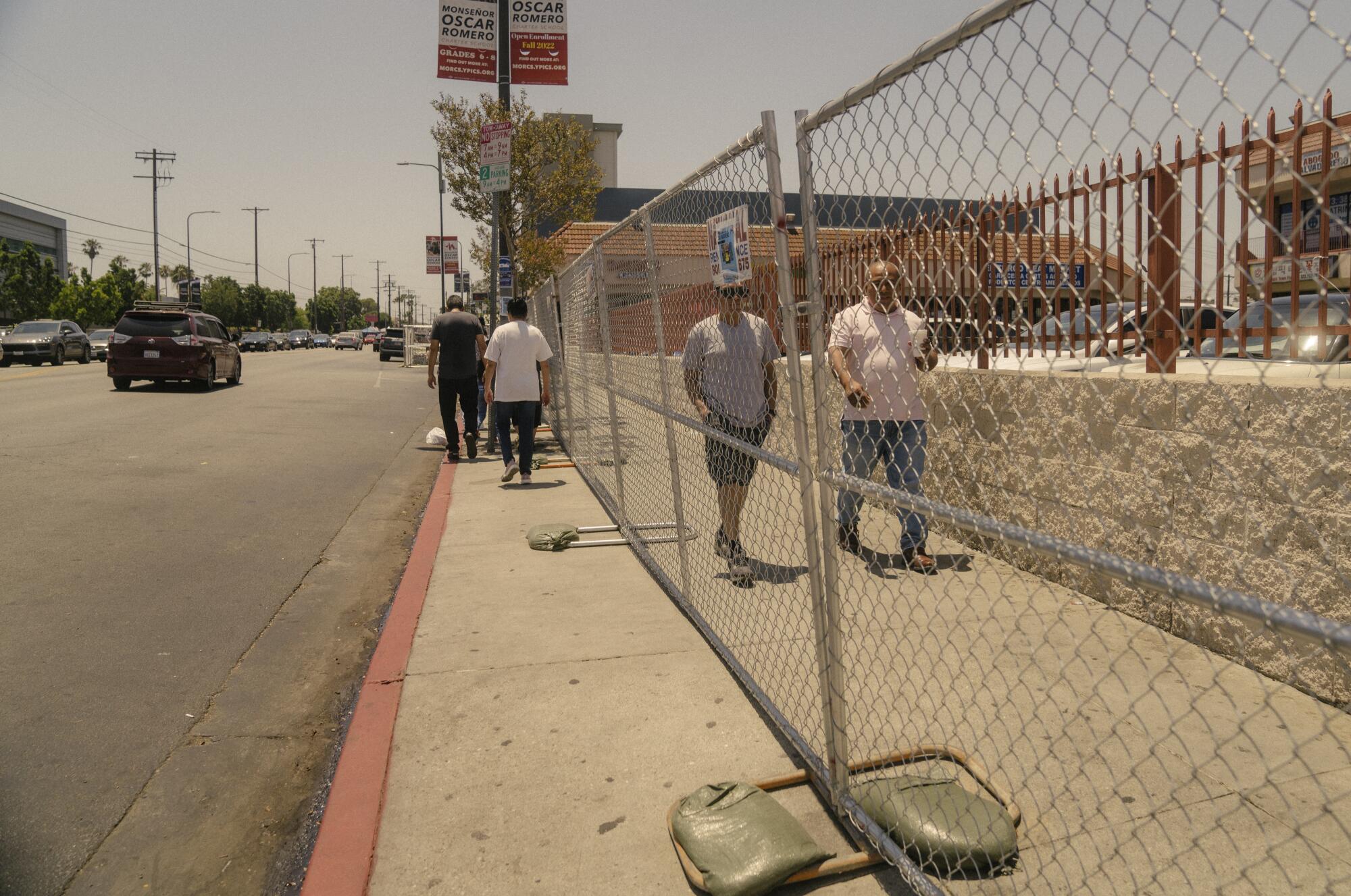
One Monday in early May, they showed up to work but were stopped by newly erected chain-link fencing and sandbags. The mother-and-daughter team, along with more than 50 vendors, lost a full day of work, and communication lines with regular customers were suddenly broken.
The city said it had warned a week earlier with fliers that crews were coming to do a clean-up and beautification project of the area. The market has been so popular that over time, neighbors began complaining of vandalism, threats, trash and an overflow of traffic.
Losses from the May 9 shutdown had a direct impact on the lives of the two women and their small business, with weeks’ worth of fresh fruit spoiled due to lack of sales. Fresh jocotes alone cost the pair $500. “It’s very difficult,” Berta Mendez said. “Estamos perdiendo.” We are losing.
“We are not asking them to give us” a handout, Rebecca Mendez said. “The only thing we ask is that they let us work. We know, I am very aware that we are a problem, but we need to survive.”
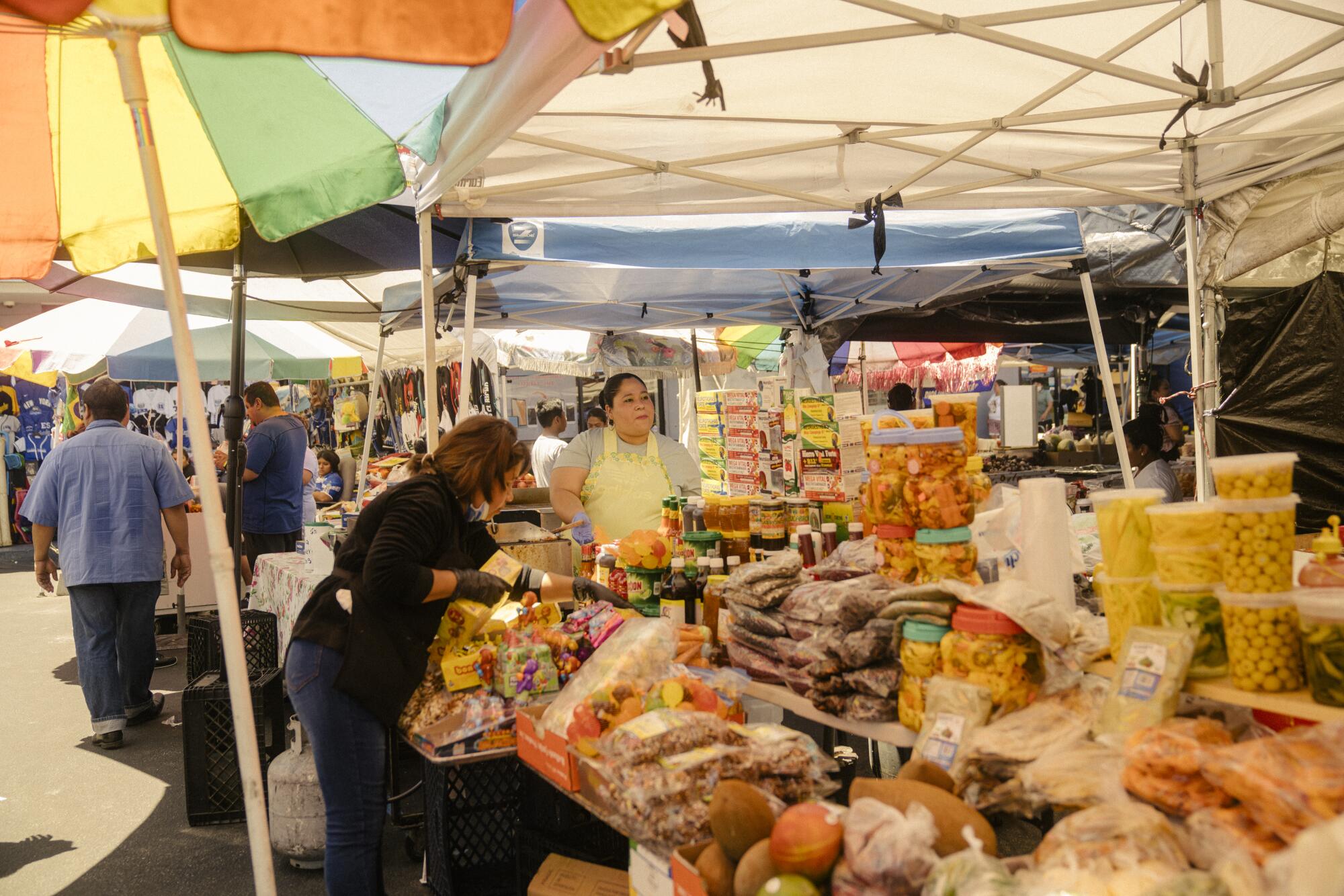
Seeking home
Years ago, when I asked the matriarchs in my family where they shopped for ingredients when they were newly arrived in Los Angeles and looking for a taste of home, they all pointed me in the direction of the market, which has been on Vermont Avenue for more than 20 years. It was everything I was looking for — the sounds, the flavors, the feelings. As an immigrant woman who desires more than a distant connection with my homeland, this market has allowed me to actively participate in my culture.
Vendor calls of “Pase adelante, ¿qué va querer, corazón? ” (“Come right in, what are you looking for, love?”) greet me as I navigate the cramped pathways filled with Salvadoran staples like crispy fried yucca served with bright and tangy curtido, blood clam ceviche or green mango with alguashte (pumpkin seed powder).
But the stresses generated by the market to the immediate area have always been present.
On Aug. 6 and 7, Salvadoran Americans will gather to confirm their collective identity through cultural and religious events in several U.S. cities.
An informal market for the last 20 years, its vendors haven’t always had proper methods of waste disposal provided for them. Some have been known to dump used oil down storm drains or on the street, making for sewage trouble and creating slippery sidewalks.
A resident of the Pilgrim Towers, a senior housing building nearby, said tenants have been submitting complaints for nearly a year, while other nearby residents began complaining at least three years ago.
Impacted street vendors from the closure on May 9 were left with no option but to find new or less familiar places on Venice Boulevard, parts of Pico Boulevard and other surrounding areas.
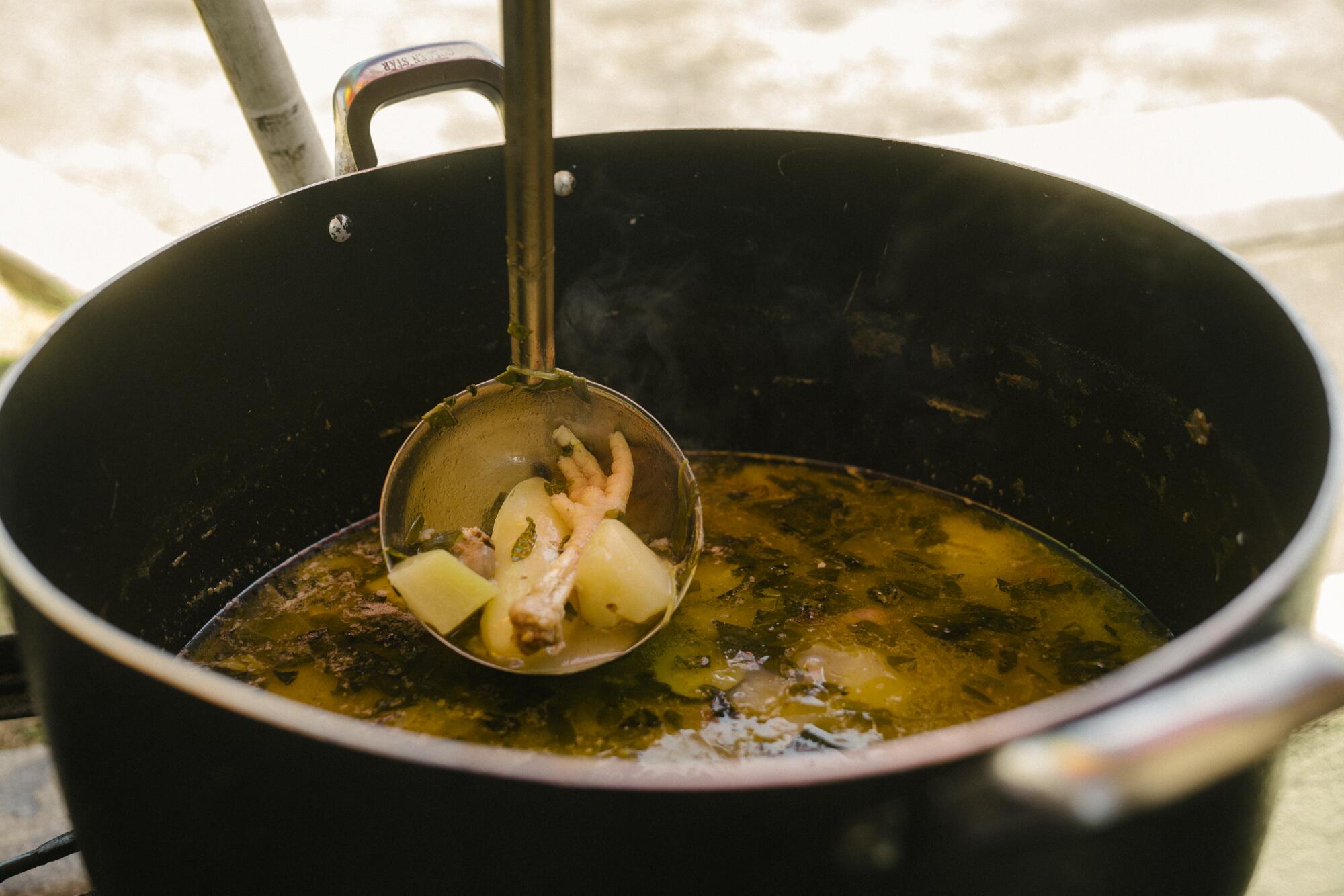
Complicated solutions
The case is a classic battle of negotiation over public space in urban Los Angeles. Despite the city’s embrace of immigrant cuisines and the efforts from nonprofits, organizers, petitions and legislation to legalize street vending, this is a repeated pattern reminiscent of so many chapters in L.A.’s history: The Lincoln Heights Avenue 26 night market, the Leimert Park Village Vendors and the South Central Farm closure all come to mind.
The solutions are as complicated as they are historical and political.
Los Angeles has the largest population of Salvadorans, second only to the homeland, a fact so beloved by the Salvadoran immigrant community that both the Salvadoran Community Corridor and L.A. at large are affectionately known as the “15th department,” a tip of the hat to the 14 departments, equivalent to counties or similar jurisdictions, in El Salvador proper.
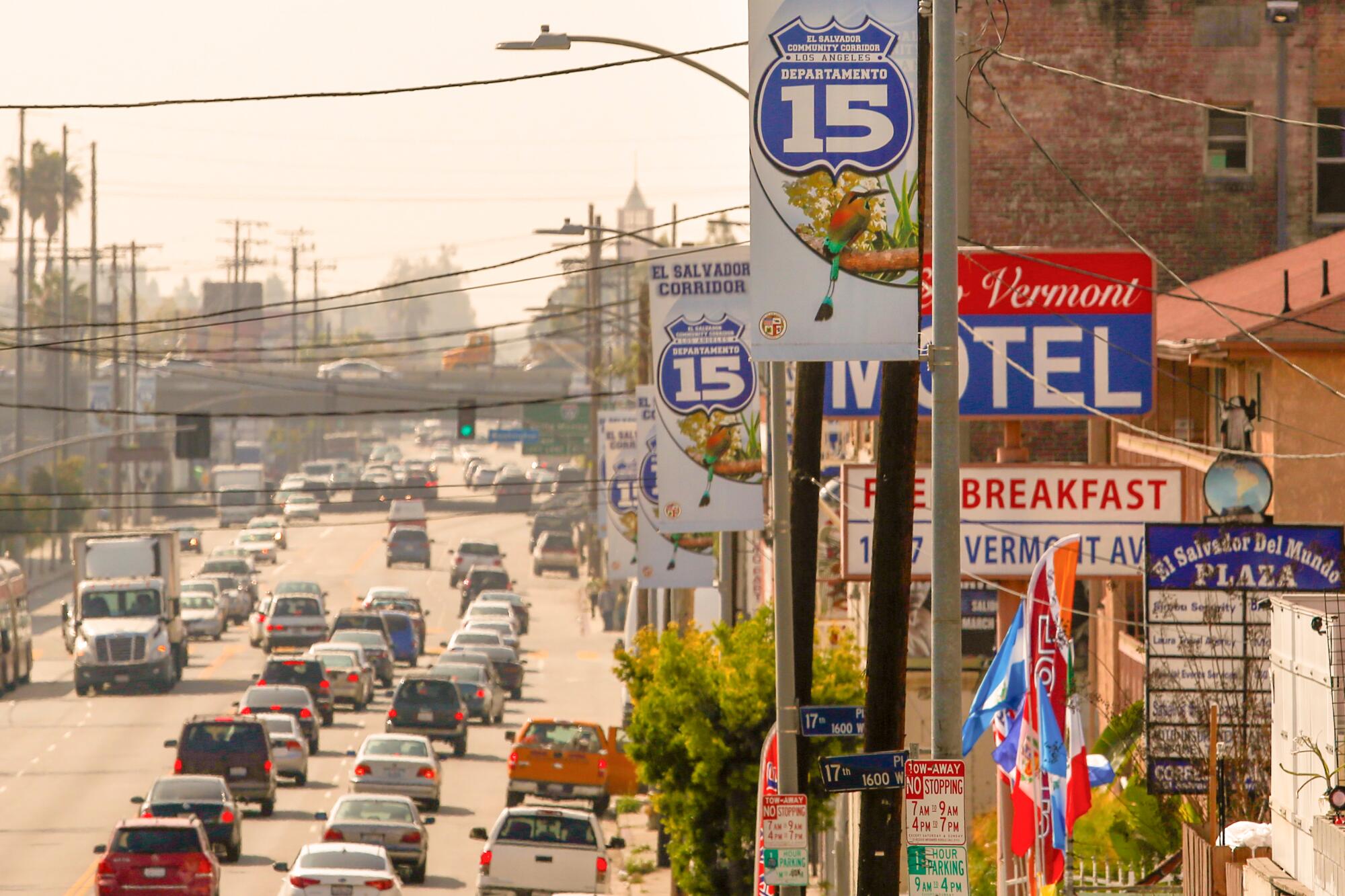
The exact details of how this famous and iconic market sprang to life are loose, but what the majority of the people involved can agree on is that it all started with a bank — and coconuts.
Before the impromptu market existed, and definitely before it was the burgeoning marketplace that it has become, 1133 Vermont Ave. in Koreatown, known as the Two Guys Plaza, was home to Banco Agricola, a Salvadoran-serving bank. In the 1980s, this bank was one of the few places in the city where the Salvadoran diaspora could send money back to El Salvador, which at the time was deep in the throes of a violent civil war between leftist guerrillas and the government. Tens of thousands of Salvadorans fled north, toward the United States and beyond.
Lines at the bank in L.A. were often long; as the story goes, where many saw a long line, a coconut vendor saw a business venture. Rain or shine, this coconut vendor became the first to informally do business in the plaza. As the Salvadoran community in Los Angeles grew, so did this “new” market.
Over the decades, it became a cultural touchstone.
Back then, the Latin markets, good as they were, mostly carried Mexican ingredients, and this meant those with more specific Central American needs were sent to look on Vermont. The neighborhood was officially designated as the El Salvador Corridor in 2013, and according to the official corridor website, it has approximately 150 businesses between 11th Street and Adams on Vermont Avenue.
The Salvadoran leader’s bid may be unconstitutional, and Salvadoran immigrants who fled his autocratic rule fear another civil war.
The formal designation did little to protect the street market. And there are deeper, less obvious dynamics at play. While around 50 vendors were burdened with the challenge of finding a new, safe, well-populated area to make sales, another 50 vendors located inside the Two Guys Plaza parking lot were able to stay and continue selling.
When the sidewalk closure happened, vendors had to disperse and separate into smaller groups. One group of three vendors moved across the street in front of the Bank of America, another group set up closer to Venice, and others did the same on both sides of Vermont.
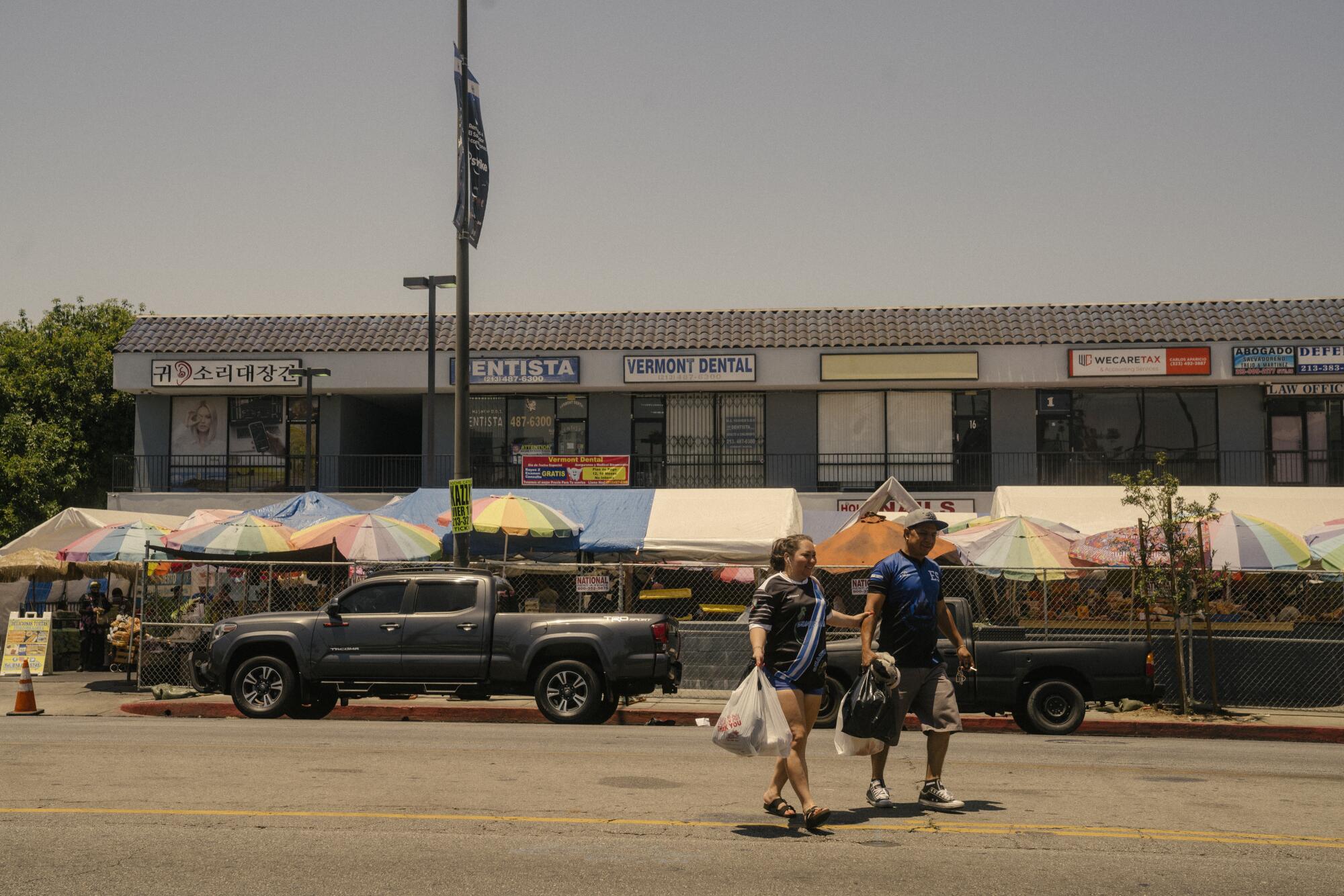
This revealed that groups or subcategories exist among the vendors, who are often identified as “los de la 12,” “los de la 11” and “los del parkeo,” or “those on 12th” “those on 11th” and “those on the parking lot plaza.” The challenges facing these groups of vendors are as different as their offerings.
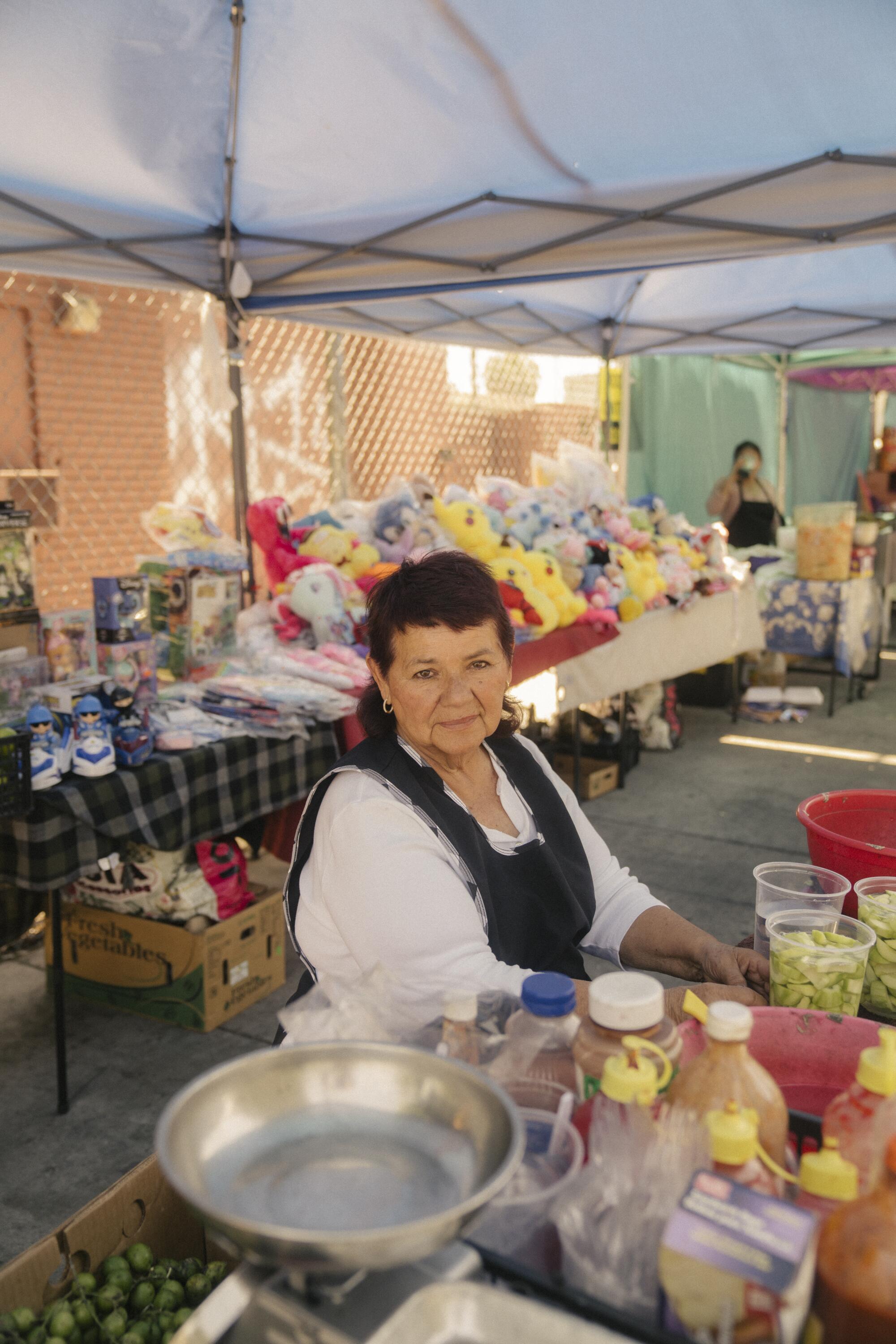
One of the vendors who relocated by the Bank of America is Ana Sanaberia. She sells fresh fruit like mangos, mamoncillos and nances, as well as roasted cashews, brightly colored meringues and toys for children. For more than a decade, she has set up on Vermont between 11th and 12th.
For Sanaberia, the sidewalk closure could not have happened at a worse time. Within the same month, she was robbed and lost $6,000. When she reported the incident to the police, her landlord evicted her from her home of 15 years for contacting the police, she said. “Life is difficult,” Sanaberia said ruefully. “I ask God until how long I can endure this. I think for very little time.
“They are all vendors, they are all ladies, older ladies, and we do not harm anyone. If there were rules, ‘Look, don’t sell this, clean it up,’ people understand and change, and they don’t see that.”
Then there are the vendors within the parking lot of the Two Guys Plaza. These vendors enjoy a kind of seniority within the market, most of them with 15 years or more of time there. Those who were able to stay did so due to a deal they brokered with the owner of the plaza. For $1,500 per month, the parking lot vendors can have a 10-by-10-foot spot, guaranteed. On average, vendors in the parking lot said they end up paying around $2,500 to $3,000, per month since most need more than one spot.
The son of the owner of the parking lot, Antonio Canzona, when reached for comment, declined to confirm these figures or address the predicament of the outdoor market in general.
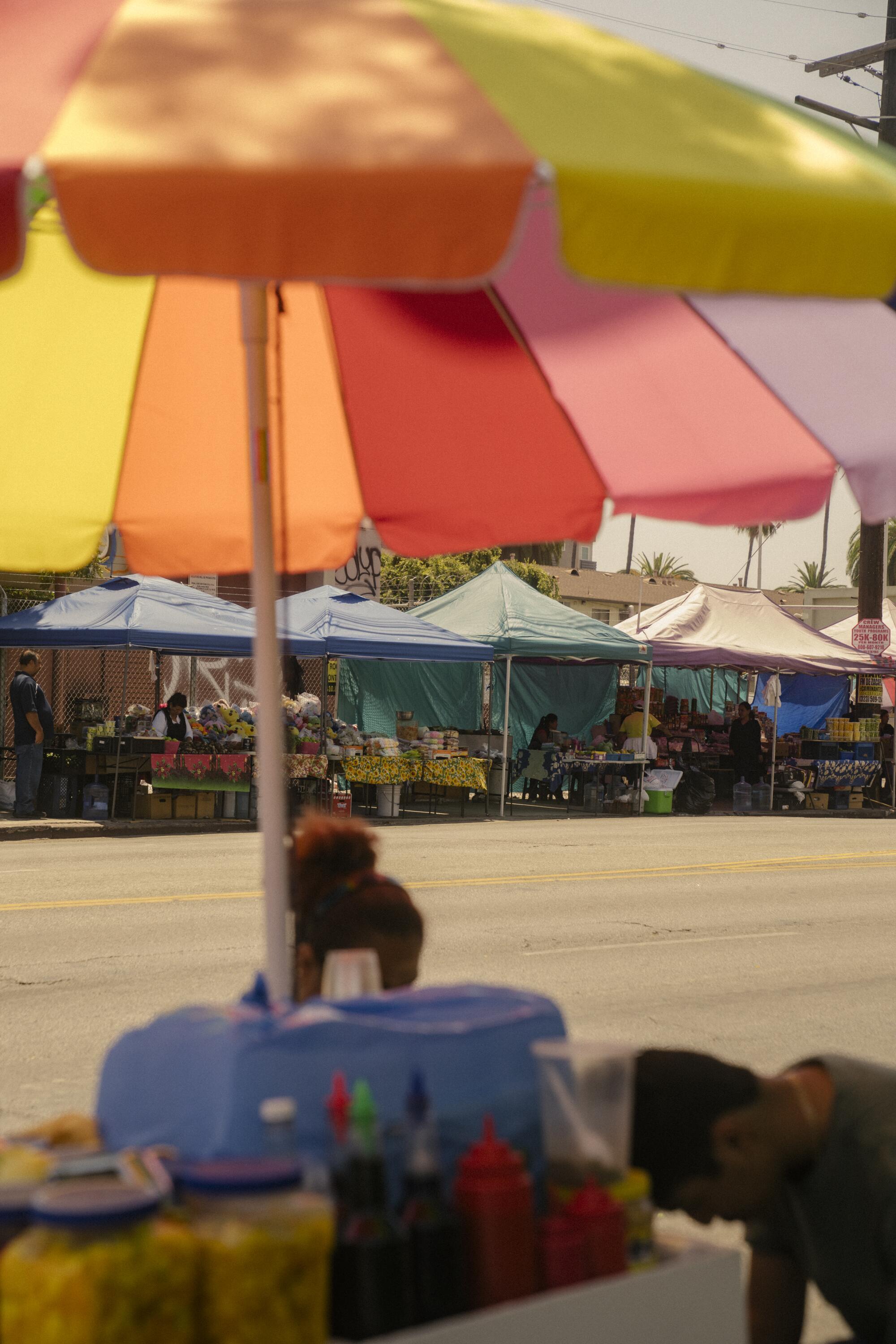
In an effort to meet street vendors’ immediate need to find a new location during the sidewalk closure, organizers from the Salvadoran American Leadership Educational Fund looked for a temporary solution. The staff managed to find a location one block west — a parking lot that belongs to the Korean Sae Han Church.This arrangement, of course, had its hang-ups, and it didn’t last.
There was proximity to the corridor, trash receptacles, handwashing stations and trash pick-up, but vendors were out of sight from their audience: passersby and car traffic. Most challenging for the vendors was the inability to do business on Sundays, the market’s most popular day, as the church needs the lot for services.
Armando Valle, a seller of mariscos de curiles — a blood clam dish prepared with citrus, chopped tomatoes, red onion, cilantro, hot sauce and sometimes salsa perrins, or Worcestershire sauce — liked the idea of having a spot at the new location. However, the inability to do business on Sunday was a deal-breaker.
“That’s when we sell the most, Saturday and Sunday,” said Valle. “I was on the sidewalk here in this area for 10 years, and many people know me. The idea is fine, but we need Sunday.”
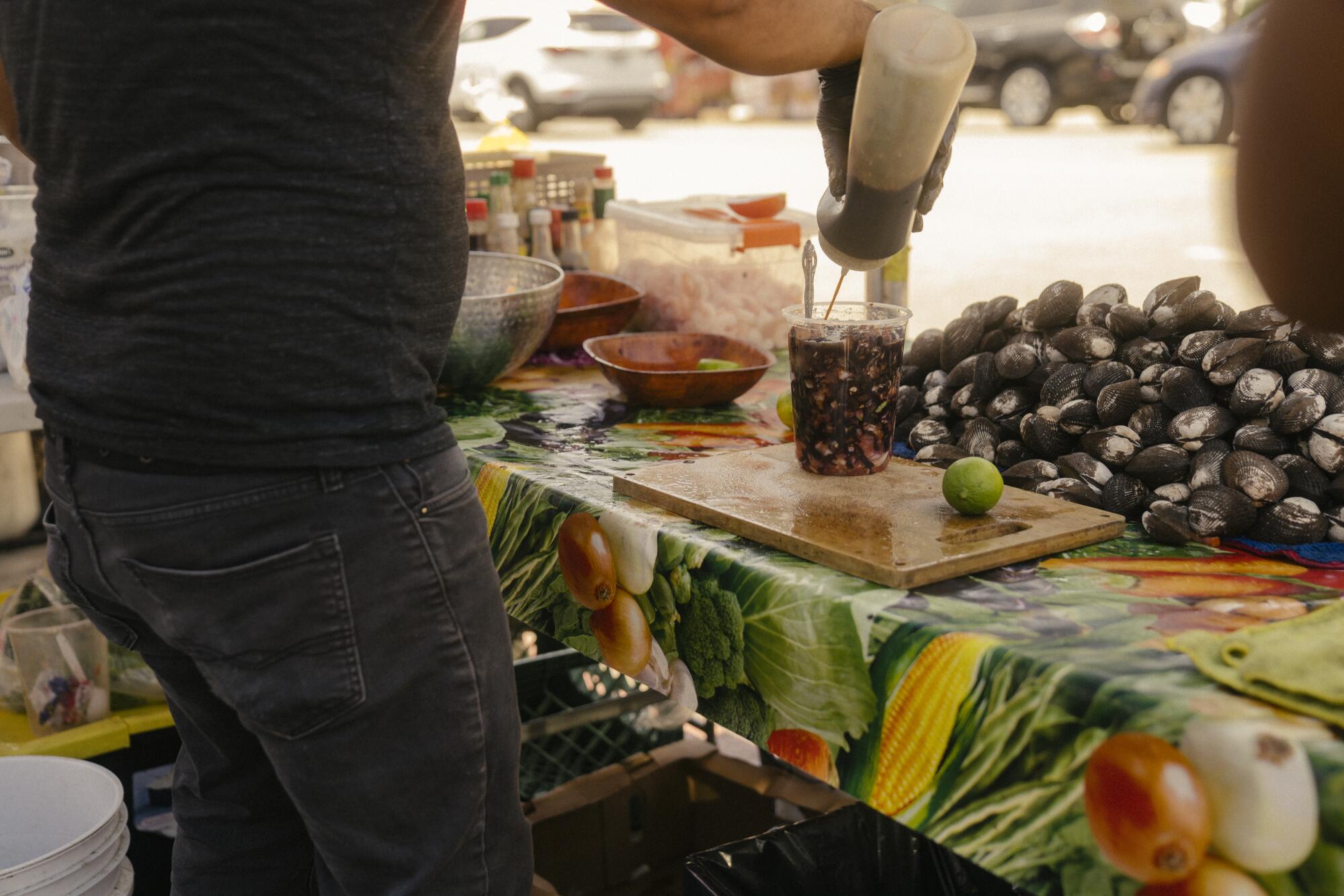
Out of order
Organizing among the vendors has caused rifts due to the variations between them. Some set up only on Saturdays, some only on weekends, some seven days a week from 7 a.m. to 8 p.m. and some want more stall space on the street.
Representatives from the El Salvador Corridor office are mostly business-minded Salvadoran Americans with ties to nonprofit organizations. Many were schooled under early leaders in the 1980s, who first got together to bring resources to the Salvadoran community in L.A. They have worked to create the Salvadoran corridor designation with the city. Although the office has supported the market in the past, some vendors on the ground said they were fed up with its lack of leadership.
“There are people who are taking a political slice of it as they use us as a pretext [to get] press to make themselves known, but in reality, they have never helped us,” said Douglas Ulluoa, a clothing vendor.
On a mission to document Salvadoran recipes, Karla Vasquez of SalviSoul has run into a major stumbling block: the U.S. cookbook publishing industry.
Raul Claros, the new executive director and president of the El Salvador Corridor, disagreed with the sentiment that there is a political tilt to his work with the corridor.
“My vested interest here is to get as many people on the same page as possible,” Claros said. Jumping in as the new president after leaving a role at the local office of the American Red Cross, he sees himself more as a facilitator and mediator in the struggle over the informal market. But his goals include other pursuits. “We are not in charge of the street vendors,” he said.
On a recent trip to El Salvador, he said he met with the U.S. Embassy and was invited to be a part of the Summit of the Americas. His help also is being requested now by other immigrant groups who want to see a corridor of their own in Los Angeles.
But Victor Galindo, another clothing vendor, has been voicing the lack of progress to protect the market over the years.
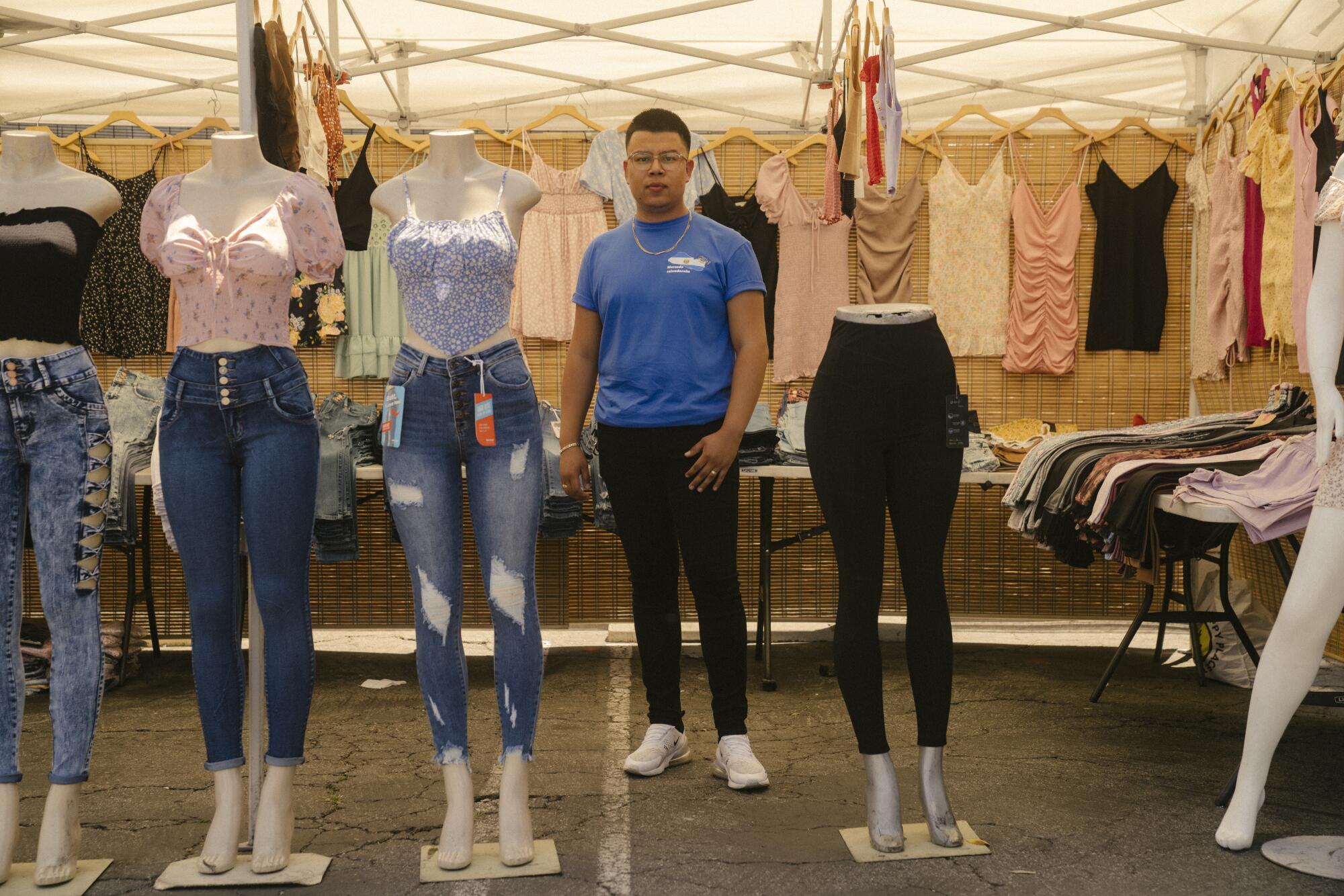
“Well, basically, we are losing days of not working, between meetings, listening to a group, listening to an organization, listening to someone who has political goals, we are not going to get anywhere,” Galindo said. “The ‘corridor’ is us, the sellers, not the organizations.”
Claros, however, has claimed the news media is misinforming and miseducating the public.
Claros recounted what he pointed out at a meeting with vendors, saying that he wanted to “educate you [vendors] on who you are and who you are not. You are not the El Salvador Corridor per se, you are vendors on the El Salvador Corridor.”
Months after the latest closure, two groups have formed among the vendors. Those who desire to remain on the street are the majority. The second group talks about buying land so that they’re not on the street anymore, circumventing the instability that comes with it.
The majority group is called Mercadito Salvadoreño, led by Brenda Montoya. The second group is led by Galindo and is named El Nuevo Mercadito Salvadoreño.
“The sidewalk is the solution,” said Montoya, who has been at the market for more than 25 years.
“What happens is that we don’t agree with the leadership,” said Rosa Gonzalez, who has been selling pupusas at the market for two years. “We want someone like us, that the leadership is vendors, not people who have established businesses.”
City interest
This informal market has always been large, but Claros believes that it grew even more due to the pandemic.
“There was no regulation. More people started coming. Especially those that were not from the area, which also made more traffic. More clients. More people,” he said. “From a cultural point, I’ll tell you it’s a beautiful thing. But this is Los Angeles, and there are rules and laws here that are different than in El Salvador. And what was happening on the sidewalk was not acceptable.”
After the clean-up and beautification process was completed, the temporary sidewalk fence came down in late July. The street stalls — and familiar tensions — promptly returned.
In Los Angeles, the pupusa is thriving, as made abundantly clear by the Pupusa Fest.
For years, the market has collectively tried to find ways to convince the city to help — formalize the space, provide basic sanitation like trash cans, solve the traffic problems — but the cycle of empty promises and abrupt clean-up measures hasn’t resolved much.
In an interview, incoming City Councilmember Eunisses Hernandez said she supports the street vendors and understands the issues are systemic.
“It’s really obvious that we’re in this mess because the city has not provided the infrastructure or the support to both the business owner there but also to the vendors,” Hernandez said.
“I see us being able to provide that trash collection, provide the steam cleaning of the streets, on a regular basis. And so it’s like, when you have other business corridors like the Salvadoran corridor existing, and it’s not getting the same investment..”
Hernandez echoed the same questions some of the vendors have expressed. ”Why are we not doing the same thing in these areas? I mean, I know a lot of why because, you know, these committees are mostly migrant, mostly Spanish-speaking people, monolingual speakers, and it really is about valuing one community over another, especially in this district, where the difference is so plain in sight.”
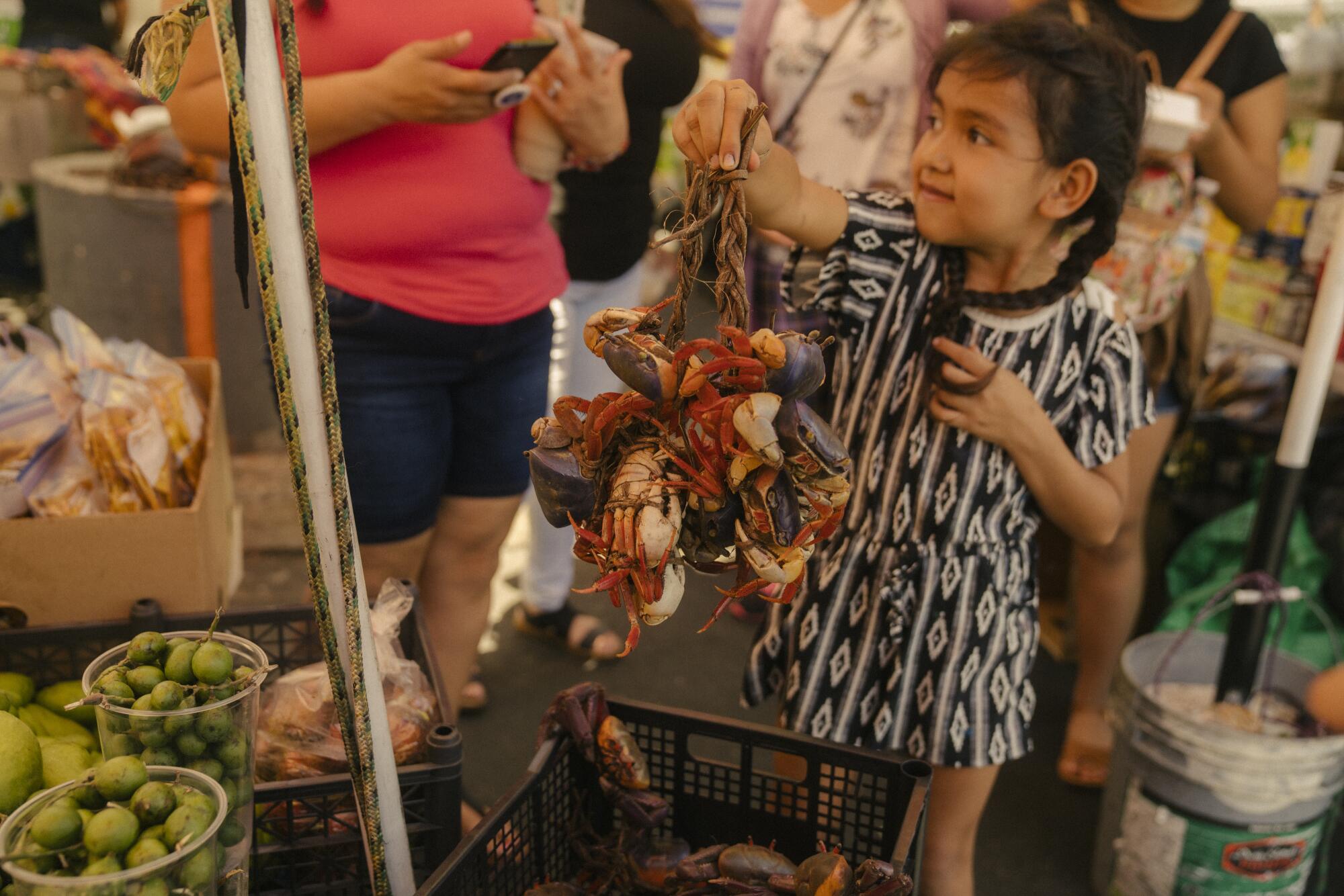
Beautiful relajo
According to Claros, reports from the residents on neighboring streets continually decry lack of public safety, vandalism and alleged threats from some vendors toward the residents. “I came in crisis response mode to get everybody to the table, and I was successful,” Claros said. “It wasn’t so much the city against them, it was the residents that had issues.”
One of those residents, Jovita Carrillo, has lived in the neighborhood for more than 40 years and is a member of several community councils in the area. She said the problems surpass the pandemic and that she is tired of the tensions between residents and vendors.
The trouble really escalated about seven years ago, said Carrillo. She and her neighbors have dealt with not only trash and accidents due to hot oil on the street but also threats and costs incurred from having installed security video cameras.
When asked if she felt hopeful with newcomer Hernandez as the new face of District 1, unseating disgraced incumbent Gil Cedillo, Carrillo said, “I am not even 1% with her, I am 2000% against her. How can she help us?”
The new degree program could serve as a model for California’s other community colleges seeking to serve the state’s large numbers of Central American students.
Jocelyn Duarte, executive director of the Salvadoran American Leadership Educational Fund, said she wants to find solutions.
“At the end of the day it’s about meeting everyone’s needs, and that’s hard. This is really a negotiation of space,” Duarte said. “We have a symbolic area right now, that’s an honorary [title], what we call a Salvadoran corridor. We need to have a space that’s created for our community, where folks can do what they have to do without being exploited. There has to be layered solutions.”
Most of the vendors do not want to leave the corridor, and if they do, they want to go together, despite their differences. Some in the community have suggested a farmers market, which would involve a host of other parameters and regulations. However, none of them are farmers. Most are resellers of goods bought in bulk. Filing for a community event permit also would impede them from operating the way they do now. Community event permits limit the number of days vendors can do business to a 90-day cycle. Still, no clear or easy solution is apparent.
“I don’t want to be a problem for this country. I don’t want to be a burden. I want to work,” said Rebecca Mendez. “I want to get ahead on my own, but many times the system won’t let me.”
“Why do other folks go to other farmers markets and pay $6 for a pupusa, but you’ll pay a street vendor $2?” Duarte said.
“This is something cultural, it’s something essential for the Salvadoran community of Los Angeles. People from all over the country visit us from Southern California, Northern California, Washington, Texas and New York. When you’re here, practically it’s as if you were in El Salvador — you revive your roots,” said Montoya. “Not so much in the product that you can’t find elsewhere but also in style. It is something fundamental, for Salvadorans, in any part of the world who come to visit us. Like the Placita Olvera is essential for Mexicans, they want to remember something of their country. Like that, this is that place.”
Indeed, part of the charm and personality of the market is its relajo — its chaos, an explicit sensory overload invitation to an open secret and unapologetically loud and proud space, one of Los Angeles’ most exciting food spaces.
“This space is a place of healing, a place of community and culture. I think this is why this is such a controversial thing is because everybody is so invested in this space,” said Jasmine Tobar, a customer and an organizer with SALEF. “I remember coming in the ’90s as a little girl to buy cards at that store to call my abuelita and everybody in El Salvador. Our community deserves larger than this, and I think that’s the conversation.”
Ricardo Lopez and Maricela Serrano, a couple who were affected by the May 9 closure, see the street opening back up as good, but they are frustrated that nothing has really changed. “We will still be exposed to ticketing, but this is a risk that we as street vendors have to take.”
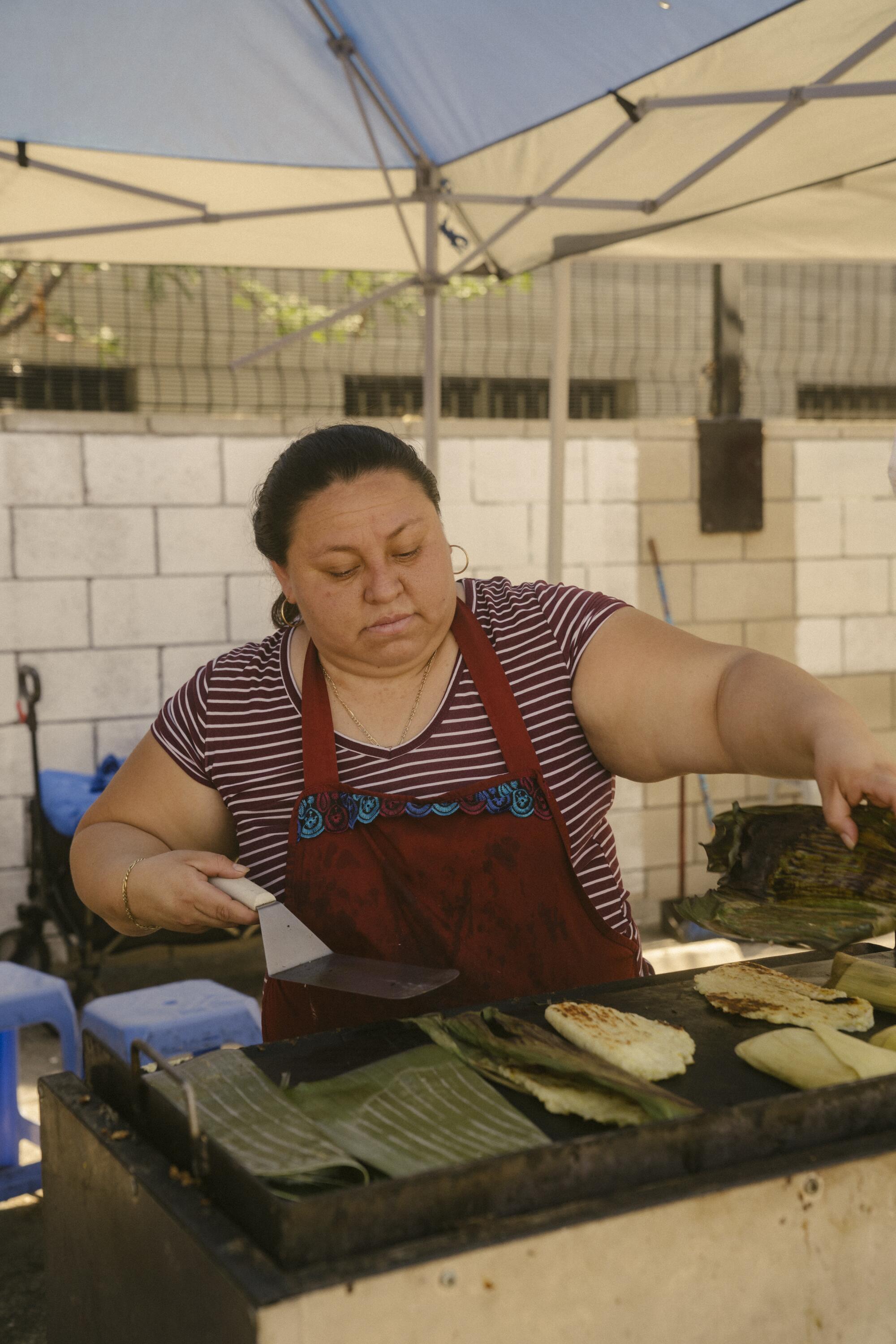
They have been selling pupusas, riguas and tamales, but with the closure, they decided to take Capital Semilla’s seven-week course that helps them with a business plan,, permits and the like. They now have their hearts set on a lonchera, a food truck. “What we want is advocating for more education [on resources] for the vendors. We can go into other businesses, have the same food.”
Until they get their truck, they remain in limbo, and caught in the middle.
Looking to the horizon, even the vendors who are renting space at the Two Guys Plaza can’t buy their way out of their uncertainty. According to Claros, the city attorney has given the owner some notice about the use of the parking lot, and those vendors might soon be looking at a similar fate as the street vendors.
With emotion in her voice, Sanaberia gets down to the soul of the market. “We are the Salvadoran diaspora, [people] come and go shopping like they would at a little market,” she said. “And without them, we don’t survive.”
Karla Tatiana Vasquez is a writer and a culinary professional who is working on “The SalviSoul Cookbook,” forthcoming, with Ten Speed Press.
More to Read
Eat your way across L.A.
Get our weekly Tasting Notes newsletter for reviews, news and more.
You may occasionally receive promotional content from the Los Angeles Times.
